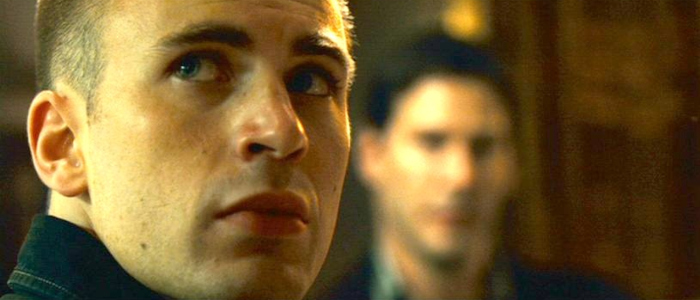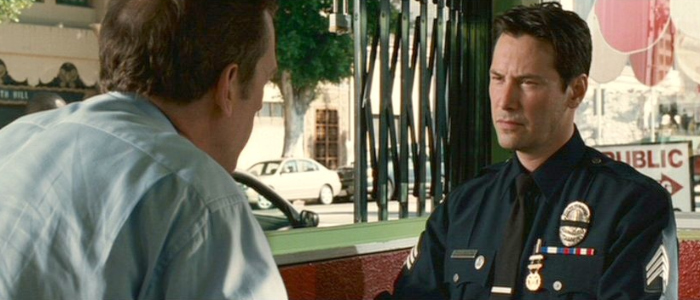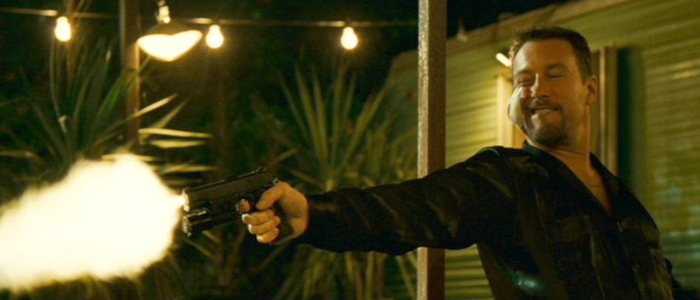The Unpopular Opinion: Now That You Love Keanu Reeves Again, It's Time To Re-Watch 'Street Kings'
(Welcome to The Unpopular Opinion, a series where a writer goes to the defense of a much-maligned film or sets their sights on a movie seemingly beloved by all. In this edition: Keanu Reeves never needed a comeback and the underrated Street Kings proves it.)Keanu Reeves has been in the public consciousness since the mid-80s, and while he's had his ups and downs success-wise, he's currently enjoying the biggest popularity wave of his career. That's no small thing as he's been in a whopping 64 movies since his debut in 1986's Youngblood with a filmography that includes critical darlings (River's Edge, 1986; My Own Private Idaho, 1991) and box-office hits (Speed, 1994; The Matrix, 1999). As an example of how quickly his tides can turn, Reeves made three movies in 2018, but while you might have caught Destination Wedding – and you're a fool who hates love if you haven't – you probably haven't even heard of Siberia or Replicas. Just one year later, though, and Reeves is a global sensation again thanks to John Wick: Chapter 3, Always Be My Maybe, and the upcoming Toy Story 4.
This past weekend even saw him take the stage at E3 to help announce his role in a new video game called Cyberpunk 2077.
So, yeah, I'm thinking Keanu Reeves is back, and with this newly invigorated interest in all things Keanu, I'm hoping people take the time to dig into his extensive and varied filmography to seek out some gems they may have missed along the way. Man of Tai Chi (2013) is a fun flick with terrific fight action, The Replacements (2000) is a sweetly satisfying underdog sports tale, and The Night Before (1988) sees him sell Lori Loughlin to a pimp. How are you not already heading to the video store?!
If I could only pick one of his past films for people to rediscover, though, it would be David Ayer's Street Kings (2008). Yes, the same Street Kings currently sitting at 36% on Rotten Tomatoes alongside an underwhelming 58% audience score.
It's a top five Reeves film for me, and even on re-watches, it never fails to entertain, thrill, and satisfy. The action sequences are crafted with visceral intensity, the dialogue and villainy are heightened fun, and the character interactions are equally tense and electrifying. The supporting cast is stellar, but Reeves is center stage the entire film and does solid work as a detective prone to brutality who discovers he's part of a bigger and dirtier web of corruption. It's a tight, engaging, and constantly entertaining flick that pairs Ayer's energetic direction with an aggressive script co-written by James Ellroy (L.A. Confidential, 1997), Kurt Wimmer (Equilibrium, 2002; Salt, 2010), and Jamie Moss (probably a very nice young man despite having 2017's Ghost in the Shell on his resume).

The film sets its tone almost immediately as Det. Tom Ludlow (Reeves) wakes, pukes, drinks, and heads out to sell a machine gun to Korean gang-bangers. The deal goes awry, due as much to the antique weapon he offers them as to his racist comments, and the thugs leave him beaten and collapsed as they take off with his car. That was the plan all along so that Ludlow could track the car, and when he gets to their house he quickly and violently dispatches of the four men inside before securing his ultimate goal – the rescue of two teenage sisters being held captive for nefarious purposes.
It's a thrilling opening sequence, but the high is intentionally leveled when we see Ludlow plant a gun and some drugs before the other cops arrive. He's the film's protagonist, but he's no hero. Capt. Jack Wander (Forest Whitaker) knows some laws have been broken, including through Ludlow's borderline inebriation, and he quickly whisks his detective to the hospital before anyone realizes the truth. A pattern is made clear that when Ludlow or the other Vice Special Unit members cross the line – which is often – Wander is there to play clean-up. He's been Ludlow's friend and mentor throughout the younger man's career, but he hasn't been helping him out for free.
Antihero cops are no strangers to action/thriller cinema, but Ludlow and his cronies are far from the Martin Riggs style of enjoyably reckless, rule-breaking heroism. His teammates serving under Wander are revealed to be full-on bad guys while Ludlow himself sits just removed on the periphery. He beats suspects – he beats one in a search for answers before being reminded that he's neglected to even ask the question yet – and the accusation is made that Ludlow may be racist. Curiously, and fascinatingly, he doesn't really refute it. Again, he's not a good guy, and that's an unlikely but interesting angle to take with your protagonist.
Ludlow's journey, and the film's central narrative arc, sees him come to terms with his own personality and style of violent policing. On one side are cops who've moved beyond "mere" assault into the realm of murder, blackmail, and theft, and on the other are truly good officers doing the badge proud. It's his growing awareness of the latter, particularly after one of them – Officer Terrence Washington (Terry Crews) – dies in his arms, that leads him to open his eyes to the more extreme corruption he's been a part of. Washington's death even happens as Ludlow is preparing to beat him up for filing complaints about him to Internal Affairs. The irony! The film is very story-focused, but his character arc is an intriguing addition that adds some weight while also giving Reeves room to stretch a little. He plays Ludlow as a man of conviction and sincerity with little time for other opinions and viewpoints, but his culpability in it all creeps to the forefront and Reeves makes it clear he's a man struggling with what he thought he knew.

Far from being a Scrooge-like character who awakes one day with a complete change of heart, Ludlow draws a line between his own brand of lawlessness and what he views as the real bad guys. That group initially includes gun-toting thugs but grows to include cops whose crimes are motivated by greed and sadism. To him, it's a cop's role to "hold back the animals" by any means necessary, and we even get a short speech clearly inspired by Jack Nicholson's rant in A Few Good Men (1992) suggesting a civilized society needs cops like him. His newly discovered truths, though, about corrupt cops and so-called friends, lead to Ludlow asking "What happened to just locking up bad people?"
"We're all bad Tom," is the reply, after which Ludlow shoots the unarmed and handcuffed man dead.
This is the end of the movie! Ludlow's arc of awareness ends with him killing an unarmed man and then challenges viewers to disagree with his choice. Those who do will understandably not enjoy what comes next as Ludlow is essentially rewarded for his actions by becoming a player in a game he initially wanted no part of, but it's that level of cynicism that reminds favorably of '70s thrillers. I said "essentially rewarded" for a reason as this isn't the path Ludlow thought he was on, and even when he sides with the powers of good he discovers it comes with strings. The world is a sticky place where good and bad mingle and diddle both in the shadows and in the light, and that resulting grey area is where a tired Ludlow lands.
The film in some ways resembles the more serious Dark Blue (2002) – perhaps unsurprisingly as it's written by Ayers and based on a story by Ellroy – but where that movie defers to a historical moment and a real societal awakening (alongside a killer Kurt Russell performance), Street Kings leans harder towards pure entertainment. The action here isn't of the ludicrous and improbable '80s style, but Ayer is aiming for a balance of action that's both fun and dramatic. To the former, we get some exciting gunfights and a thrilling foot chase, and to the latter, we're made to feel every gunshot and impact whether they're in walls or flesh. We also get fantastic dialogue like Ludlow catching a fleeing suspect and discovering his name is Quicks. "Not quick enough," says Ludlow and we all laugh because he is the literal best.
The script also does something unexpected with Ludlow's character on the personal front. He has a girlfriend named Grace (Martha Higareda), but his backstory involves a wife who died under mysterious circumstances – it appeared to be a natural death, but she was having an affair, and the unknown man simply left her on the side of the road to die. You'd expect the reveal that one of Ludlow's corrupt fellow cops was the other man, but there's no surprise, last-minute truth bomb to be found here. Ludlow seems destined to never know who she was cheating with and why the man left her to die. It gives Ludlow a slightly haunted quality, and Reeves' performance channels that blend of sadness and rage well without the need for flashbacks or overkill. Much of the film is action, violence, and aggression, but there are softer moments throughout, particularly between Ludlow and Grace, and Reeves sells them as tender breaks where he can put his guard down and enjoy another person's presence.

As mentioned, the supporting cast is every bit as great here. Whitaker plays his character big and loud, Hugh Laurie's on-hand as an IA captain whose end goals might not be as squeaky clean as they appear, and the wonderfully prickish trio of Jay Mohr, John Corbett, and Amaury Nolasco make up Ludlow's criminally sleazy team. A fresh-faced Chris Evans plays a good cop investigating Ludlow's bad deeds, and Naomie Harris, Common, and Cedric the Entertainer all make memorable appearances as well.
Reeves' latest rise in pop culture comes with an almost universal focus on his existence as a nice guy. His most recent characters are fun and likable, and his off-screen antics consist of acts of generosity, kindness, and absolute purity. He's probably helped four elderly ladies cross the street in the time it's taken you to read this. I get it, the guy's a treasure, and that's all the more reason to dig in and enjoy the roles that challenge that persona. Street Kings isn't the only film to do so, and there are some where he's a straight up villain – he plays a full-on serial killer in The Watcher (2000) – but it's a terrifically entertaining experience as he brings to life a bad guy turning just good enough. Well, good-ish anyway.
